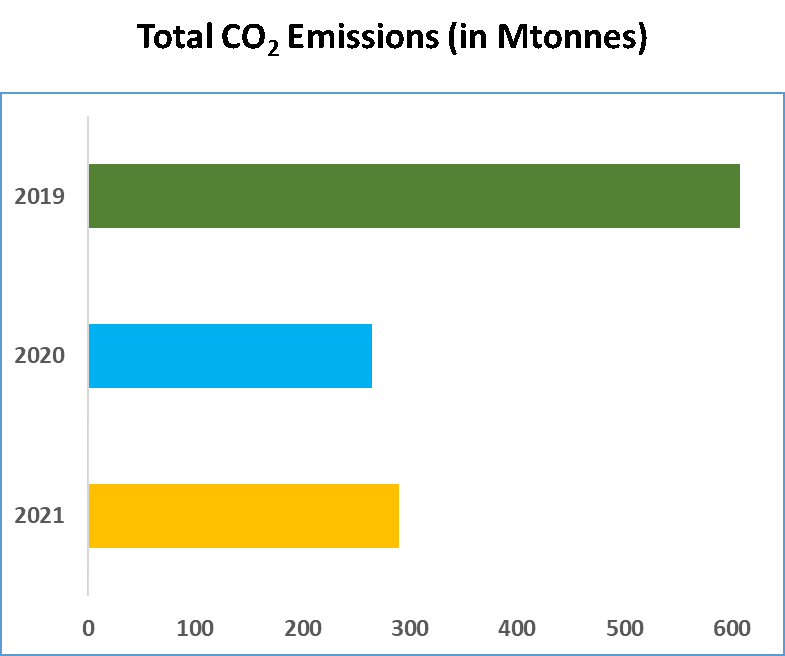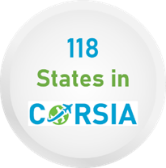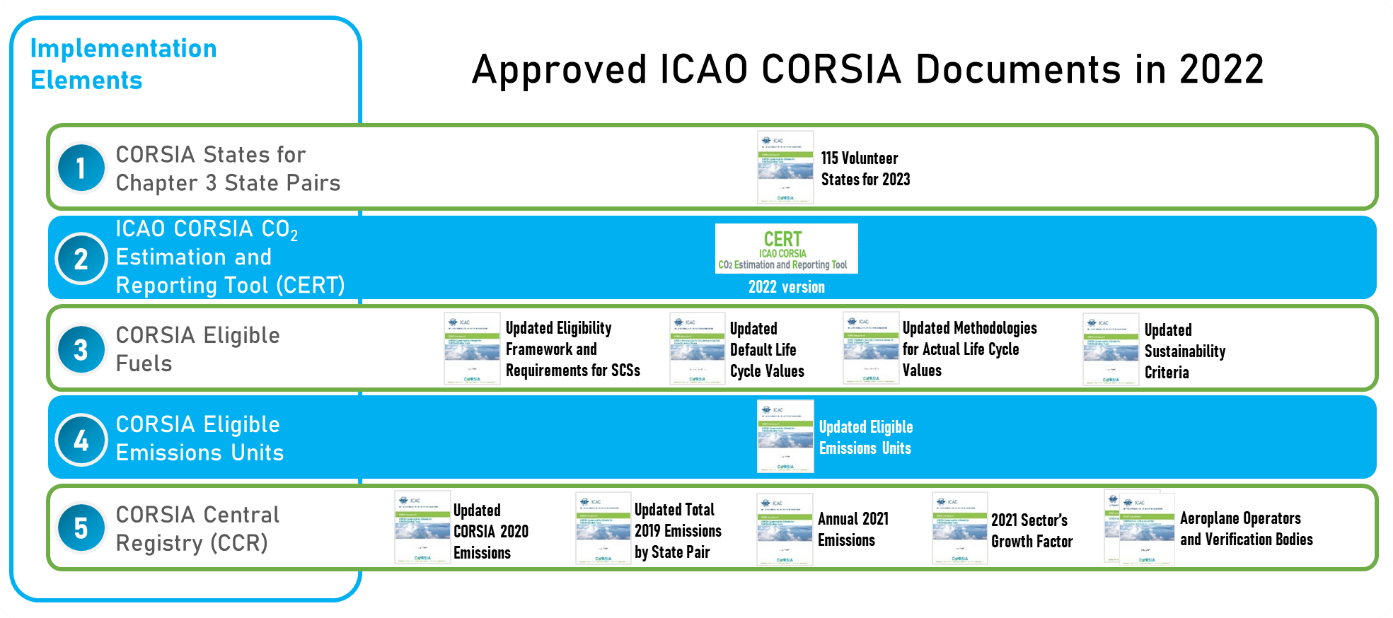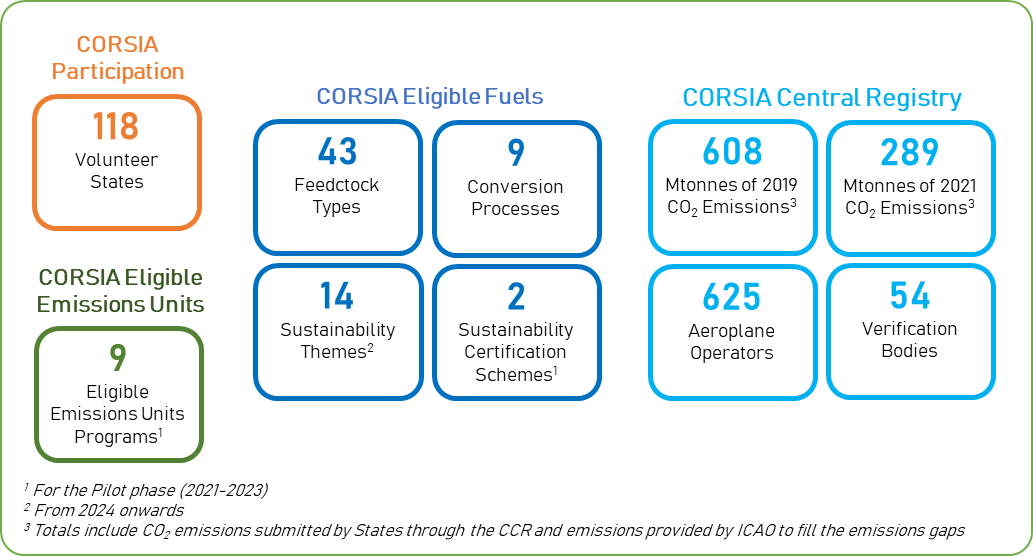The Carbon Offsetting and Reduction Scheme for International Aviation (CORSIA) is the first global market-based scheme that applies to a sector. It complements other aviation in-sector emissions reduction efforts such as technological innovations, operational improvements and sustainable aviation fuels to meet the ICAO aspirational goal of carbon neutral growth. In this article we are sharing the CORSIA updates and developments that took place over the last year.
 In 2022, CORSIA implementation remained on track. States and operators continued to fulfill their CORSIA-related requirements in accordance with Annex 16, Volume IV. More than 96% of CO2 emissions for the period 2019-2021 have been reported through the CCR ensuring the successful implementation of CORSIA. States’ determination to enhance the environmental effectiveness of CORSIA has been reflected in the increase in the number of States voluntarily participating in CORSIA from 88 States in 2021, to 107 States in 2022, and to 115 States from 1 January 2023.
In 2022, CORSIA implementation remained on track. States and operators continued to fulfill their CORSIA-related requirements in accordance with Annex 16, Volume IV. More than 96% of CO2 emissions for the period 2019-2021 have been reported through the CCR ensuring the successful implementation of CORSIA. States’ determination to enhance the environmental effectiveness of CORSIA has been reflected in the increase in the number of States voluntarily participating in CORSIA from 88 States in 2021, to 107 States in 2022, and to 115 States from 1 January 2023.
Throughout 2022, the ICAO Council continued to advance the development and update of all CORSIA Implementation Elements (more details below under 2022 CORSIA Highlights). The availability of all ICAO CORSIA documents, following their approval by the Council, has enhanced the transparency of implementation.
During 2022, the ICAO Council completed the first periodic review of CORSIA, which resulted in recommendations for adjustments to the Scheme that were adopted by the 41st Session of the ICAO Assembly in October 2022 and have been incorporated in the Assembly Resolution A41-22 on CORSIA.
In accordance with Annex 16, Volume IV, in November 2022, States were to calculate (for the first time) the 2021 CO2 offsetting requirements for operators attributed to them. Given the reductions in emissions due to COVID-19, the 2021 Sector’s Growth Factor has been calculated by ICAO as zero, thus resulting in no offsetting requirements for operators for 2021.
2022 CORSIA highlights
Starting on 1 January 2022, aeroplane operators compiled their 2021 CO2 emissions and verified them through the third-party verification process established under CORSIA. Operators submitted their verified 2021 emissions reports to their State of attribution (deadline: 31 April 2022). Throughout the year, operators continued to monitor their 2022 CO2 emissions (to be reported in 2023).
States collected CO2 emissions data from their operators, performed an order of magnitude check, aggregated emissions and submitted to ICAO (deadline: 31 July 2022) through the CORSIA Central Registry (CCR). States also used the CCR to report information on aeroplane operators attributed to them, and verification bodies accredited in them (deadline: 30 November 2022).
In 2022, the ICAO Council approved the following ICAO CORSIA documents, which were published on the ICAO website (month and year in parentheses indicate time of approval by the ICAO Council):
- List of States (3rd) that volunteered to participate in CORSIA offsetting requirements from 1 January 2023 (July 2022);
- 2022 version of the ICAO CORSIA CERT (November 2022);
- Updated CORSIA Eligible Fuels information, specifically: CORSIA eligibility framework and requirements for sustainability certification schemes (2nd ed.), CORSIA default life cycle emissions values for CORSIA eligible fuels (4th ed.), Methodology for actual life cycle values (3rd ed.) (June 2022); and Sustainability criteria for CORSIA eligible fuels (3rd ed.) (November 2022);
- Updated CORSIA Eligible Emissions Units (7th and 8th eds.) (March and November 2022) acting upon recommendations of the Technical Advisory Body (TAB);
- Updated CORSIA Central Registry information, specifically: 2019 CO2 emissions (2nd ed.); Annual CO2 emissions (1st ed.) for 2021; Annual Sector’s Growth Factor (1st ed.) for 2021; CORSIA 2020 emissions (2nd ed.) (to be used for determining new entrants) (October 2022); and Aeroplane operators attributed to States (7th ed.) and Verification bodies accredited in States (10th ed.) (December 2022).
The 41st Session of the ICAO Assembly adopted Resolution A41-22 on CORSIA, which incorporates the following adjustments to some design elements of CORSIA that were recommended by the ICAO Council during the first periodic review of CORSIA:
- Use of 2019 CO2 emissions data for the determination of the baseline of CORSIA as follows:
- 100% of 2019 CO2 emissions for the pilot phase (2021-2023); and
- 85% of 2019 CO2 emissions from 2024 onwards;
- Determination of CO2 offsetting requirements as follows:
-
- 100% sectoral approach for the period 2021-2032; and
- 85% sectoral approach and 15% individual approach for the period 2033-2035.
The above-mentioned CORSIA-specific developments were highlighted in various editions of this newsletter in 2022. ICAO will continue to provide regular updates on the implementation of CORSIA in future editions.
In December 2022, the Secretariat updated the CORSIA webpages to reflect the outcome of the 41st Session of the ICAO Assembly, including an updated set of CORSIA Frequently Asked Questions. Other updates that are in process, and are expected to be finalized in early 2023, including a new set of CORSIA leaflets and a new CORSIA brochure.
Looking to this new year
In 2023, the Council is expected to complete its work on the update of Annex 16, Volume IV and Doc 9501, ETM, Volume IV based on recommendations from the Committee on Aviation Environmental Protection (CAEP), and on consequential changes as a result of the adoption of Resolution A41-22. New editions of both documents will be published during the second part of 2023.
 ICAO will continue to work with all ICAO States to ensure that they have all the necessary means to facilitate their continuous implementation of CORSIA. ICAO has received the notification of three more States to join CORSIA from 1 January 2024 (bringing the total number of participating States to 118) and is looking forward to more States joining the CORSIA offsetting requirements (deadline for receipt of participation notifications: 30 June 2023).
ICAO will continue to work with all ICAO States to ensure that they have all the necessary means to facilitate their continuous implementation of CORSIA. ICAO has received the notification of three more States to join CORSIA from 1 January 2024 (bringing the total number of participating States to 118) and is looking forward to more States joining the CORSIA offsetting requirements (deadline for receipt of participation notifications: 30 June 2023).
ICAO will continue to support all States cooperating under the ACT-CORSIA programme and in the spirit of ICAO’s No Country Left Behind initiative.
Upcoming CORSIA Implementation Deadlines (2023)
In accordance with Appendix 1 to Annex 16, Volume IV , in 2023, States will receive verified Emissions Reports and associated Verification Reports by 30 April. States are reminded that the order of magnitude check is to be finalized as soon as possible in order to submit aggregated CO2 emissions through the CCR by 31 July. Key CORSIA deadlines for 2023 are highlighted below.
- 1 January 2023 to 30 April 2023: Aeroplane operators to compile 2022 CO2 emissions data to be verified by verification bodies.
- by 30 April 2023: Aeroplane operators and verification bodies to submit to States the verified Emissions Reports and associated Verification Reports for 2022 CO2 emissions.
- by 30 June 2023: States to notify ICAO of their intention to participate in the CORSIA offsetting requirements from 1 January 2024 (for first time participation only).
- by 31 July 2023: States to conduct an order of magnitude check of the verified 2022 Emissions Reports, including any filling of data gaps in case of non-reporting by aeroplane operators, and use the CCR to submit aggregated 2022 CO2 emissions data and, if applicable, information on CORSIA eligible fuels.
![]() CORSIA Capacity Building
CORSIA Capacity Building
ACT-CORSIA is the ICAO Assistance, Capacity Building and Training programme on CORSIA. It was established in June 2018 and encompasses the CORSIA Buddy Partnerships and all other ICAO outreach materials (see below).
The ACT-CORSIA Buddy Partnerships rely on individual training of CORSIA Focal Points and are the core of capacity-building activities. A total of 136 States participate in the ACT-CORSIA Buddy Partnerships. More information can be found here.
For 2023, the focus of the training under the ACT-CORSIA Buddy Partnerships will continue to be on the use of the CORSIA Central Registry and, in particular, the reporting requirements as relating to CO2 emissions and CORSIA-eligible fuels.
![]() Navigating CORSIA: A guide to the scheme’s design and implementation
Navigating CORSIA: A guide to the scheme’s design and implementation
Since adopting the CORSIA-related Standards and Recommended Practices (SARPs) in 2018, ICAO has developed the remaining elements needed for CORSIA implementation. Click here for an infographic on the status of all implementation elements. Click here for an updated set of CORSIA Frequently Asked Questions.
The ICAO CORSIA website contains materials to support States, operators and verification bodies in their work towards implementation of CORSIA, namely:
The CORSIA Verification Course provides training on how to verify CO2 Emissions Reports that have been prepared by aeroplane operators, in accordance with the provisions of the CORSIA Standards and Recommended Practices (SARPs).





